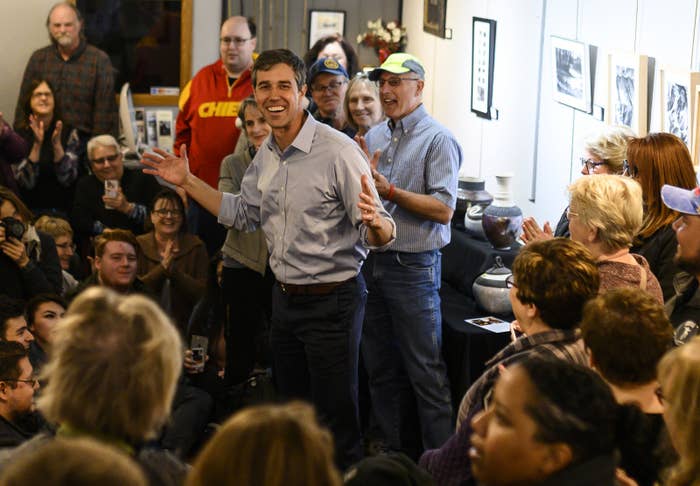
MOUNT VERNON, Iowa — Sydney Holland had heard pundits say that Beto O’Rourke was inexperienced and a policy lightweight, without specific answers on immigration or health care. She’d seen people claiming he might not be a real progressive. So she drove two hours across Iowa this weekend to see him for herself.
Holland watched as O’Rourke leaped nimbly up on the countertop at the Sing-A-Long Bar and Grill, which he’d packed to capacity, an overflow crowd next door and dozens more spilling out onto the chilly streets of Mount Vernon.
“I wanted to hear him personally, and he delivered,” Holland, a student at the University of Iowa, said after O’Rourke’s speech. “He was down-to-earth, so humble. I can tell that he cares about each and every one of us.”
O’Rourke’s entrance into the presidential race unleashed a wave of cynicism and hard-boiled skepticism on insider Twitter and cable news — the rough opposite of what his run against Sen. Ted Cruz in Texas elicited from the media last fall. There were groans on Twitter for everything from O’Rourke’s habit of jumping up on counters to his campaign website’s merchandise to a Vanity Fair cover story published the day before O’Rourke announced his run — summed up by a CJR reporter with, “why is he running this is so dumb.”
Across a breathtaking succession of stops throughout Iowa, from three different countertops, one podcast studio, and one truck bed, the first three days of O’Rourke’s campaign unfolded a world away. It wasn’t that Iowans hadn’t seen the skepticism about O’Rourke. It was that many of them didn’t much care. They saw an O’Rourke much closer to the one stormed across Texas, coming within a narrow margin of defeating Cruz.
They were entranced, they said, by his charisma, his oratory, and his particular style of campaigning — down-to-earth, personal, and relentlessly positive. Though few were willing to commit to voting for him, as is common this early in Iowa, many said they were convinced that he could deliver on the promise of unity that he offered at every campaign stop.
“I tend to agree with some of the stories … but I look at him and he’s the only one that gives me that hope,” said Anne Phillips, a graphic designer who saw O’Rourke interviewed for a podcast in Cedar Rapids. “I want reconciliation, and he brings that to my heart. I sense in him that he can bring us back together.”
“He is able to articulate who he is and what he believes in a way that I have not seen yet by anybody else,” said Scott Johnson, a retired IBM employee in Cedar Rapids who said he had seen seven Democrats on the 2020 campaign trail so far. “I understand now why he got $70 million in Texas — why in a red state he came so close. It’s his personality.”
In Iowa, O’Rourke rarely went deep on policy, but he did make the bones of his campaign clear. O’Rourke is betting that Democrats are hungry for bipartisanship and unity more than anything else — a gamble that cuts against conventional wisdom about Democrats in the Trump era. He is offering progressive-minded pragmatism, not left-wing revolution; relentless positivity, not fighting; and soaring oratory, not wonky specifics.
He frequently worked to straddle the line between progressivism and moderation. One frequent refrain: “If we become too ideological or too prescribed in the solution, we may allow the perfect to become the enemy of the good.”
At a library in Independence, Iowa, O’Rourke opened with the story of a conservative he’d met earlier that day in a coffee shop who welcomed him to Iowa and thanked him for running a positive campaign. “This is what America needs more of,” he said. Asked what set him apart from other Democrats, he spoke of his bipartisan work on veterans issues and his ability to speak to voters in red states.
He evaded a question about his record on fossil fuels, instead opting to speak broadly about the urgency of climate change — without actually endorsing the Green New Deal, a brainchild of Rep. Alexandria Ocasio-Cortez that has the backing of many other top contenders for the Democratic nomination, like Sens. Bernie Sanders, Kamala Harris, and Cory Booker.
Debbie Koopman, a retired child care worker who saw O’Rourke speak in Mount Vernon, said she’d walked away from his soaring speech without much sense of his solutions for health care, a topic that he often speaks of broadly. “It’s — well, it’s health care for all,” she said. “What he’s saying is what I’ve heard before.”
But Koopman said she didn’t mind; O’Rourke was offering something else. “It’s that feel-good feeling after all the last years we’ve had and the hopelessness that so many people feel. The rampant hate that has spread has taken us down a dark road, and we want to turn towards the light and the happy — people that are for everybody.”
It took several different reporters, and several different campaign stops, to pin down something approximating O’Rourke’s stance on health care.
He eventually admitted he’d rethought his past position that single-payer Medicare for All was the “best way" to get health care for all Americans, instead raising an option to allow people to keep their private insurance or buy into Medicare if they wanted to. That angered many progressives who consider support for a single, government-run system to be a Democratic litmus test.
Many voters in Iowa, though, didn’t see much difference between the single-payer Medicare for All proposed by Bernie Sanders’ bill and the “universal, high-quality health care for all” that O’Rourke proposed in his stump speech.
“I absolutely think we should have Medicare for All,” said Suzanne Bartlett Hackenmiller, a physician in Cedar Falls. But she said she didn’t feel strongly about whether there should be a single-payer system or an option to buy into Medicare.
“I try not to get into the financial part of medicine — I try to do my job and treat all patients the same,” she said. “But I do believe that everybody deserves to have quality health care.”
Even as some policy positions shifted from hour to hour, O’Rourke painted a clear picture, at least, of the type of campaign he planned to run — one that is markedly different from many other Democrats in the race.
He stopped in 15 Iowa towns in the space of three days, a breakneck schedule for any candidate, and spent time in smaller, redder towns and counties that are rarely the first pick of presidential hopefuls. He often drove himself, instead of handing the wheel off to an aide. And after his stops in Iowa, instead of flying out of the Cedar Rapids airport and back to Washington — he no longer has a job as a representative there — O’Rourke drove himself east, to campaign in Wisconsin and Michigan.
O’Rourke has also responded to some early criticism with transparency atypical for a presidential campaign. On his second day of campaigning, he admitted that a throwaway joke about his wife raising their children was “flip” and said it would not be repeated.
There are some early signs that O’Rourke might have lost some of his luster as a presidential candidate. In the days before he announced his candidacy, he had slipped in many polls from an initial surge in the wake of his narrow loss Cruz.
And though he rose to national prominence in part because of his small-dollar fundraising prowess in Texas, O’Rourke stayed quiet during his trip about how much money he raised in the first few days of his campaign — something that seemed at first to be an ominous sign for a candidate who solicited money for his run by telling supporters in an email, “What we raise in the first 24 hours will set the tone in the national conversation about the viability of our campaign.”
But by Monday morning, O'Rourke's campaign announced it had raised $6.1 million online in its first 24 hours, a massive amount of money that even surpasses the $5.9 million raised by Sen. Bernie Sanders in the first 24 hours of his 2020 bid. Sen. Kamala Harris had set the initial top mark of this year's campaign with $1.5 million in her first 24 hours, still an impressive number relative to past presidential campaigns.
O'Rourke's campaign said the money came from every state in the country. “In just 24 hours, Americans across this country came together to prove that it is possible to run a true grassroots campaign for president -- a campaign by all of us for all of us that answers not to the PACs, corporations and special interests but to the people,” O'Rourke said in an emailed statement.
Some voters made it clear they wanted more from O’Rourke when it came to specifics — a dynamic that could become more pronounced later in Democratic debates later this summer.
In Independence, one voter opened his question to O’Rourke by noting that Sen. Elizabeth Warren, who is also running for the nomination, “is the gold standard of policy.” O’Rourke, the voter said, had been “doing a good job identifying the issues — but I don’t think any of us have heard any particular policies.”
Greg Batenhorst, the superintendent of schools in Mount Vernon, came to the Sing-A-Long Bar armed with a tough, specific question he had prepared for O’Rourke — about what he would do on immigration issues, a topic where he has struggled in the past on policy details. O’Rourke told Batenhorst he would immediately legalize DACA recipients and highlighted the bipartisan support for immigration reform — an answer that wasn’t enough for Batenhorst and his wife, Mary Lou.
“What about e-verify? What about guest workers? I want specifics,” Mary Lou Batenhorst said.
Still, Greg Batenhorst admitted, in many of O’Rourke’s answers, “He gave more meat on the bones than I’d expected.”

